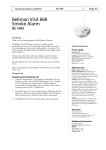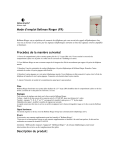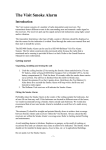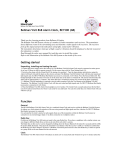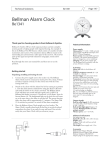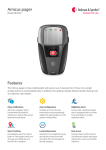Download Bellman Visit 868 Pager
Transcript
TechnicalVisit Solutions Bellman System Information Page 107 BE1470 Bellman Visit 868 Pager BE1470 Introduction Thank you for choosing products from Bellman & Symfon. The Bellman Visit 868 System consists of a number of radio transmitters and receivers. The transmitters detect different events in the surrounding area and transmit a radio signal to the receivers. The receivers pick up this signal and provide indications using light, sound and/or vibration. The transmitter determines what type of light, sound or vibration should be displayed so that the reason for the indication is evident. Technical information Power supply Getting started Mains power: Via Bellman Visit Charger, BE1260 Battery power: 1 x 1.5 V AAA alkaline or 1.2 V AAA NiMh rechargeable battery. Operating time: Alkaline: 2 – 3 weeks NiMh: Approx. 1 week on one charge Power consumption: Active: Approximately 220 mA Idle position: Approximately 1 mA Unpacking, installing and testing the unit Radio function Read through the entire user manual first and then start to install the system. Refer to the illustration of the Bellman Visit 868 System on the inside of the cover. 1. Open the battery cover (7). Fit one battery, either an AAA or rechargeable AAA type battery and close the battery cover. 2. A Bellman Visit 868 transmitter is required to test the radio reception. Press the test button on the Bellman Visit 868 Transmitter. The Bellman Visit 868 Pager will emit a light signal and will vibrate. 3. Use the clip to attach the Bellman Visit 868 Pager to an article of clothing close to the body (9). For extra security, the enclosed safety cord can be tied into the hole on the clip and secured to an article of clothing. Radio frequency: 868.3 MHz Number of Radio Keys: 64 Radio Keys as standard. Special software can be used to increase these to 256 Radio Keys in increments of 64 per software purchase. Contact the nearest supplier for further information. Coverage: The normal coverage between a transmitter and receiver in the Bellman Visit 868 System is approximately 200 metres with a clear line of sight. Coverage is reduced if walls and large objects screen off the signals. Any thick walls constructed of reinforced concrete will greatly affect coverage. The system may also be affected by radio transmitters such as TV transmitters, computers, mobile phones, etc. This means that a unit may work perfectly in one part of the room but not at all in another. Activation Radio: Bellman Visit 868 system Output signals Vibrator power: Built-in Additional information For indoor use only Size B x H x D: 57 x 86 x 29 mm Weight: With battery: 70 g Without battery: 55 g Colour: Grey with red function button. Accessories Bellman Visit Charger BE1260 Bellman Bed Vibrator BE1270 (connected to BE1260) Page 108 BE1470 Technical Solutions Bellman Visit System Information When using rechargeable NiMh-batteries, the Bellman Visit 868 Pager can also be connected to the BE1260 Bellman Visit Charger (separate product). This charges the unit and allows up to two BE1270 Bellman Bed-shakers (accessory) to be connected via the charger. Charging of the BE1260 Bellman Visit Charger (separate product) is controlled by the pager and takes up to 8 hours. During charging the LED on the charger will light up green but go out when charging is finished. If the Pager remains in the charger after charging is finished, the LED on the charger will blink green now and then to indicate that the battery is being trickle charged. Please note: WHEN USING the Bellman Visit Charger ONLY USE RECHARGEABLE NiMH BATTERIES. Non-rechargeable batteries will start to leak if re-charged! The acid in the batteries will damage the electronics in the Bellman Visit 868 Pager, BE1470 and the resulting damage will not be covered by any guarantee. Function General The BE1470 Bellman Visit 868 Pager is a receiver within the Bellman Visit 868 system for indoor use, which attracts the attention of the user using light and vibrations. It is activated via radio signals from any transmitter within the Bellman Visit 868 System. When using rechargeable NiMh batteries, the Bellman Visit 868 Pager can be connected to the BE1260 Bellman Visit Charger (separate product) to which two BE1270 Bellman Bed-shakers (accessory) can also be connected. This combination makes for better economy due to the rechargeable battery and better functionality due to the alarm call options with the Bed Shaker. Radio key On delivery all Bellman Visit 868 units are tuned to the same Radio Key. If you have a neighbour with a similar system, you can change to different Radio Keys so that you do not affect each other’s systems. The radio key on this receiver can be changed by holding down the Function Button (1) for about five seconds until the LEDs (3) and (4) blink alternately. Then press the transmitter’s test button so that the receiver’s LEDs (2-5) blink to confirm that the Radio Key has been changed. All units in a Bellman Visit 868 System must have the same Radio Key in order to operate as a group. Refer to the user manual for the relevant unit. More information is available in the Appendix. Please note: All Bellman Visit 868 products within the same system must be tuned to the same Radio Key in order to operate as a group. TechnicalVisit Solutions Bellman System Information BE1470 Indicators and Signals It is generally the transmitters in the Bellman Visit 868 System that determine how the receivers will indicate an alarm. See the description in the relevant transmitter user manual for further information. System indicators The LEDs (2 - 5) that indicate which transmitter has activated the Bellman Visit 868 Pager normally have the following meanings. • Orange LED (2) indicates a baby cry transmitter. • Green LED (3) indicates a door transmitter. • Yellow LED (4) indicates a telephone transmitter. • Red LED (5) indicates a smoke alarm. If the green (3) and yellow (4) LEDs blink alternately, this indicates that the Bellman Visit 868 Pager is in radio key selection mode. The Pager will then wait for a radio signal from a transmitter in the Bellman Visit 868 system which will adjust the receiver to the same radio key as the transmitter is tuned to. Vibration The built-in vibrator vibrates differently according to which transmitter has activated the Pager. Refer to the user manual for the relevant Bellman Visit 868 transmitter for more information about vibration patterns. When using rechargeable NiMh batteries, the Bellman Visit 868 Pager can be connected to the BE1260 Bellman Visit Charger (separate product) to which two BE1270 Bellman Bed-shakers (accessory) can also be connected. These are placed under the pillow so that the user is woken up when the Bellman Visit 868 Pager is activated. Power supply Please note: The pager will not vibrate whilst inserted in the charger. Other indicators will act as normal. If the LED (6) briefly blinks yellow, this means that the battery is flat and must be changed. Only use an alkaline AAA type battery or a rechargeable NiMh AAA type battery. Troubleshooting in brief Problem Solution Nothing happens. • Change or charge the battery. Only use an alkaline AAA type battery or a rechargeable NiMh AAA type battery. The LED (6) blinks yellow. • Change or charge the battery. Only use an alkaline AAA type battery or a rechargeable NiMh AAA type battery. The pager is not activated. • Check the batteries in the transmitters. • Check that the pager is not placed too far away from the transmitters by moving it closer to the transmitters. • Check that the pager is set to the correct radio key. For further information see Function/Radio key. The receiver signals when no transmitter is activated. • Change the Radio Key on all units in the system. For further information see Function/Radio key. Page 109 BE1470 Page 110 1. 2. 3. 4. 5. Function button Orange LED Green LED Yellow LED Red LED Technical Solutions Bellman Visit System Information 6. 7. 8. 9. Yellow low battery LED indicator Battery cover Battery removal button Clip for attaching to an article of clothing Appendix Further information Settings No adjustments are required for normal use. The relevant descriptions are provided below, if you wish to change a setting for some reason. Radio key In order to use several Bellman Visit 868 Systems close to one another without interference, different Radio Keys can be set on the different systems. All Bellman Visit 868 System units are supplied from the factory tuned to the same Radio Key, channel 0. This means that all Radio Key Switches on the transmitters are set to the OFF position. A Bellman Visit 868 transmitter is also required to alter the radio key on the Bellman Visit 868 Pager. Proceed as follows to change the Radio Key: • Set a Bellman Visit 868 Transmitter to the desired radio key by altering its radio key switch to the desired radio key. See the transmitter user manual for further information. • Hold down the function button (1) on the Bellman Visit 868 Pager until the green (3) and yellow (4) LEDs blink alternately. The Bellman Visit 868 Pager will now be in programming mode for about 30 seconds. • Press the Bellman Visit 868 transmitter’s test button. • The LEDs (2, 3, 4 and 5) will now blink five times in quick succession to indicate a successful change of radio key. • After changing the radio key, the Bellman Visit 868 Pager will automatically return to normal mode. Please note: All Bellman Visit 868 products within the same system must be tuned to the same Radio Key in order to operate as a group. Page 111 BE1470 TechnicalVisit Solutions Bellman System Information Signal pattern A Signal Pattern is the name for the way in which a receiver in the Bellman Visit 868 System indicates activation. Changing the transmitters’ Signal Switch changes the Signal Pattern which the receivers display when the transmitter is activated. The following signal patterns are available for the Bellman Visit 868 system. (Note that the Pager does not emit any sound or flash): Type LED pattern Sound Vibration Flash Green 1 Green is constantly lit 1 x ding dong, low-frequency tone Separate Yes Green 2 Green blinks in sequences of two 2 x ding dong, low-frequency tone Separate Yes Green 3 Green blinks in sequences of three 1 x ding dong, high-frequency tone Separate Yes Green 4 Green blinks constantly 2 x ding dong, high-frequency tone Separate Yes Yellow 1 Yellow is constantly lit 1 x ring, low-frequency tone Short Yes Yellow 2 Yellow blinks in sequences of two 2 x ring ring, low-frequency tone Short Yes Yellow 3 Yellow blinks in sequences of three 1 x ring, high-frequency tone Short Yes Yellow 4 Yellow blinks constantly 2 x ring ring, high-frequency tone Short Yes Orange 1 Orange is constantly lit Baby Rapid Yes Orange 2 Orange blinks in sequences of two Baby Rapid Yes Orange 3 Orange blinks in sequences of three Baby Rapid Yes Orange 4 Orange blinks constantly Baby Rapid Yes VMA Red and Orange constantly blink alternately VMA constant Long Yes Fire alarm Red blinks constantly Fire alarm constant Long Yes Fire alarm low battery Red blinks every five seconds No No No Fire alarm flat battery Red blinks every five seconds Fire alarm one short One short Yes Page 112 BE1470 Technical Solutions Bellman Visit System Information Advanced programming Advanced programming provides additional options for those who wish to make special modifications to the Bellman Visit 868 Pager. The idea is that it should be possible to select a completely unique signal pattern which is linked to activation from a specific input on a special Bellman Visit 868 transmitter. The function works regardless of the radio key settings on the units that are programmed. Please note that, for safety reasons, the function does not work with the BE1480 Bellman Visit 868 Smoke Alarm. By using advanced programming of the Bellman Visit 868 Pager, it can be adjusted so that its signal pattern corresponds exactly to what is required. In other words an entirely individual signal pattern can be programmed, such as displaying an orange permanently lit LED and a constant vibration. In order to adjust the setting, the Bellman Visit 868 Transmitter to which the Bellman Visit 868 Pager should be adapted must be available. The transmitter must also be connected so that it can be activated in the way in which it is intended to be used. Proceed as follows: 1. Hold down the Function Button (1) on the Bellman Visit 868 Pager until the green (3) and yellow (4) LEDs blink alternately. The Bellman Visit 868 Pager will now be in programming mode for about 30 seconds. 2. Hold down the Function Button (1) at the same time as the relevant Bellman Visit 868 transmitter is activated in precisely the way in which it is intended to be used. The yellow LED (6) will light up. Note that all inputs are individual, so that it is not possible to use the test button on a Bellman Visit 868 Telephone Transmitter whose telephone input will indicate the relevant pattern. 3. Scroll through the different LED options by a short press on the Function Button (1). Select the relevant indication by holding down the Function Button (1) until the LED (6) goes out and starts to shine with a constant yellow light again. 4. Scroll through the different vibration options by a short press on the Function Button (1). Select the relevant indication by holding down the Function Button (1) until the LED (6) goes out and starts to shine with a constant yellow light again. 5. The Bellman Visit 868 Pager will now show the indication method programmed. End the display with a short press of the Function Button (1). 6. After a short while, the Bellman Visit 868 Pager will automatically return to normal mode. This function is essential where a transmitter has to work in a special way with regard to a specific receiver. Resetting advanced programming It is quite easy to reset the Bellman Visit 868 Pager if it needs to be reset after it has been programmed using advanced programming. 1. Hold down the Function Button (1) on the Bellman Visit 868 Pager until the green (3) and yellow (4) LEDs blink alternately. The Bellman Visit 868 Pager will now be in programming mode for about 30 seconds. 2. Press the Function Button (1) three times in quick succession. 3. All LEDs (2-5) remain constantly on for a few seconds. 4. All the advanced programming has now been deleted and the Bellman Visit 868 Pager will automatically return to normal mode. TechnicalVisit Solutions Bellman System Information BE1470 Page 113 Testing It is easy to test the BE1470 Bellman Visit 868 Pager. If the Pager does not work as described below, you can check further below under Appendix/Further information/Troubleshooting/Troubleshooting guide. How to test A transmitter in the Bellman Visit 868 system which is set to the same radio key as the Pager is required to test the radio reception on the BE1470 Bellman Visit 868 Pager. • Press the transmitter test button. • The Bellman Visit 868 Pager will give the following indications: o The LEDs (2-5) which the transmitter has been set to indicate with or which have been programmed into the Bellman Visit 868 Pager with Advanced Programming will be switched on. o It will vibrate as the transmitter is set to indicate or in the way the Bellman Visit 868 Pager has been programmed with advanced programming. Troubleshooting You can carry out a number of checks yourself before sending a product for repair. Troubleshooting guide Problem Solution Nothing happens. • Change or charge the battery. Only use an alkaline AAA type battery or a rechargeable NiMh AAA type battery The LED (6) blinks yellow. • Change or charge the battery. Only use an alkaline AAA type battery or a rechargeable NiMH AAA type battery. The Pager does not pick up signals from the Bellman Visit 868 Transmitters. • Check that the Bellman Visit 868 Pager is set to the same radio key as the other units in the relevant Bellman Visit 868 system. For further information see Appendix/Further information/Settings/ Radio key. • Check the batteries in the transmitters. • Check that the pager is not placed too far away by moving it closer to the transmitter. The receiver signals when no transmitter is activated. • Change the Radio Key on all units in the relevant Bellman Visit 868 System. There is probably another system nearby with the same Radio Key.









